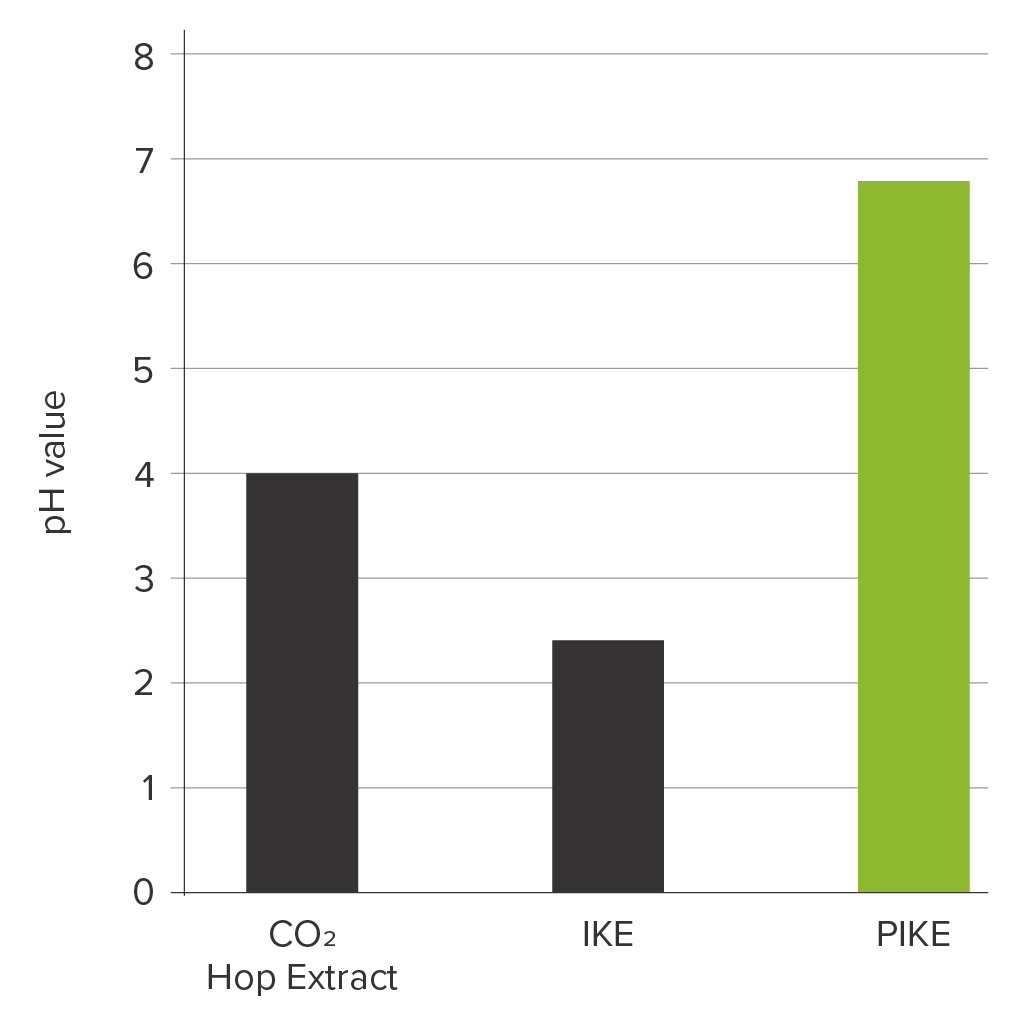
Potassium-Based Isomerized Kettle Extract
Overview
Potassium-based Isomerized Kettle Extract (PIKE) contains the potassium salt of iso-alpha acids, along with beta acids and hop oils. Due to pre-isomerization of the alpha acids, yields in the brewing process are higher.
PIKE is produced from CO2 hop extract and can be used as a partial or complete replacement for CO2 hop extract.
PIKE can also be utilized as a late hop addition at the end of wort boiling. In this case, a distinctive hop aroma in beer can be achieved with a similar level of hop utilization.

Specifications
- Short description
- pre-isomerized hop extract for use in the brewhouse for bittering and aroma addition
- Alpha acids
- < 2 %
- Iso-alpha acids
- typically 30 - 70 %
- Beta acids
- typically 12 - 35 %
- Hop oils
- typically 2 - 12 %
- pH
- 6.7 ± 0.5
- Density
- 0.9 - 1.0 g / ml (20 °C / 68 °F)
- Viscosity
- 300 - 500 mPas (40 °C / 104 °F)
Properties
Appearance
PIKE is green to brown in color.
Flavor
Beers with identical aroma and flavor profiles can be produced when PIKE is used in place of CO2 hop extract. If added at the end of the boil, PIKE imparts a typical late hop aroma to the beer.
Utilization
Based on HPLC analysis of the finished beer, utilization of iso-alpha acids can be as high as 45 - 60 %. Calculations of utilization for PIKE are based on the assumption that the iso-alpha acid yield is likely to be approx. 50 % higher than that achieved with non-isomerized extracts. Late additions of PIKE greatly enhance hop oil retention. Actual utilization will vary from brewery to brewery due to differences in equipment and process conditions
Quality
All Hopsteiner® products are processed in facilities which fulfill internationally recognized quality standards.
Packaging
Our products are delivered in their respective recommended standard packaging. Alternatives may be possible upon customer request.
Standard packages of our processing plants in the USA (US) and Germany (DE) are:
- Cans 0.5 - 4.0 kg (US)
- Cans 0.5 - 3.1 kg (DE)
- Pail 4 - 20 kg (US)
- Drum 200 kg (US / DE)
The extract can be adjusted to a specific bitter content by admixing tannin extract or glucose syrup.
Usage
PIKE is typically added to the wort kettle as a complete or partial replacement for CO2 hop extract.
Dosage
Kettle additions of PIKE are based on the concentration of iso-alpha acids, an estimated or known utilization and the desired intensity of bitterness in the beer.
Application
PIKE can be added in similar ways to regular kettle extracts. PIKE can be added to the kettle when the transfer of lauter wort to the kettle commences, at the beginning of the boil or up to five minutes before casting out the wort. Pre-warming cans of PIKE is not necessary. Suspending punctured cans in the boiling wort will ensure that all of the extract is completely flushed out into the kettle. If PIKE is added by means of automatic dosing units, it should be warmed to 30 °C (82 °F) and gently mixed to ensure perfect dosing. Unlike conventional CO2 hop extract or IKE, PIKE forms a milky emulsion with water. Therefore, any product spillage can easily be washed away.
Storage
The recommended storage temperature in the original unopened packaging is < 10 °C (50 °F).
Short-term, transport-related temperature deviations do not affect product quality.
Best Before Date
Under the recommended storage conditions, the shelf life from the date of production/ packaging is at least 2 years.
Safety
Ensure good ventilation of the workplace and wear personal protective equipment. Avoid contact with eyes and skin. Do not inhale vapors or dusts. For full safety information, please refer to the relevant Hopsteiner® safety data sheet.
Analytical Methods
International approved methods listed in commitees such as ASBC or Analytica-EBC using current standards are applied.
Product analytics
- Analytica-EBC 7.8 (HPLC)
- ASBC Hops-16 (HPLC)
- Analytica-EBC 7.10 (Distillation)
- ASBC Hops-13 (Distillation)
Technical Support
We are pleased to offer assistance and advice on:
- safety data sheets
- support for brewing trials on a pilot or commercial scale
- analytical services and information about analytical procedures
Disclaimer: The information provided in this document is believed to be correct and valid. However, Hopsteiner® does not guarantee that the information provided here is complete or accurate and thus assumes no liability for any consequences resulting from its application.
Last updated: 08/08/2024
Save PDF